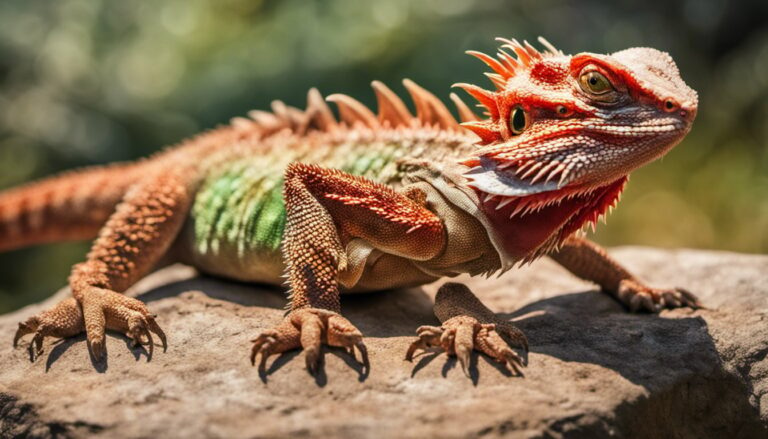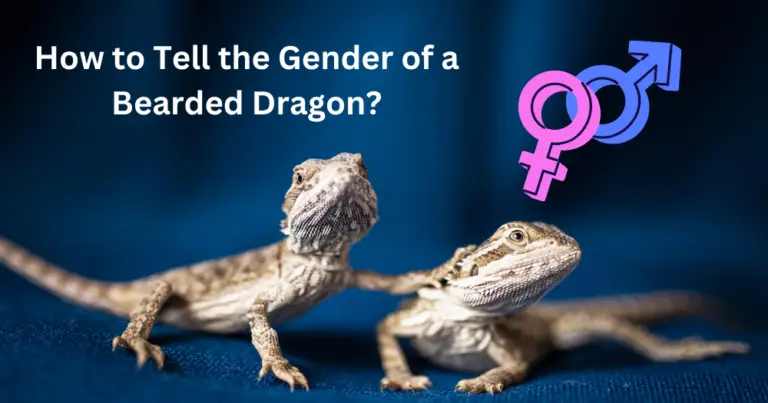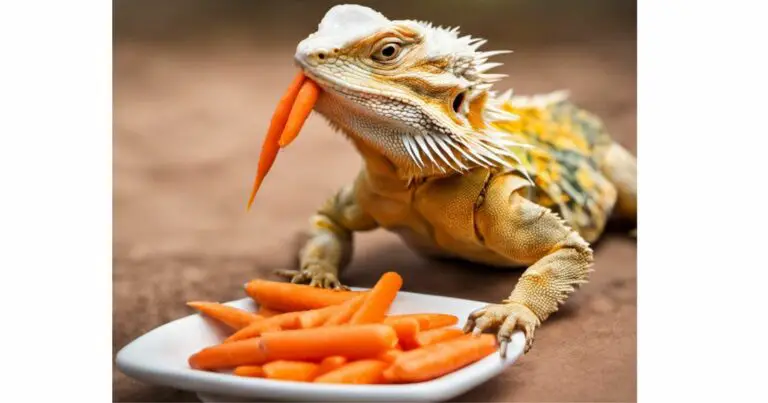Can Bearded Dragons Eat Tomatoes? The Complete Guide
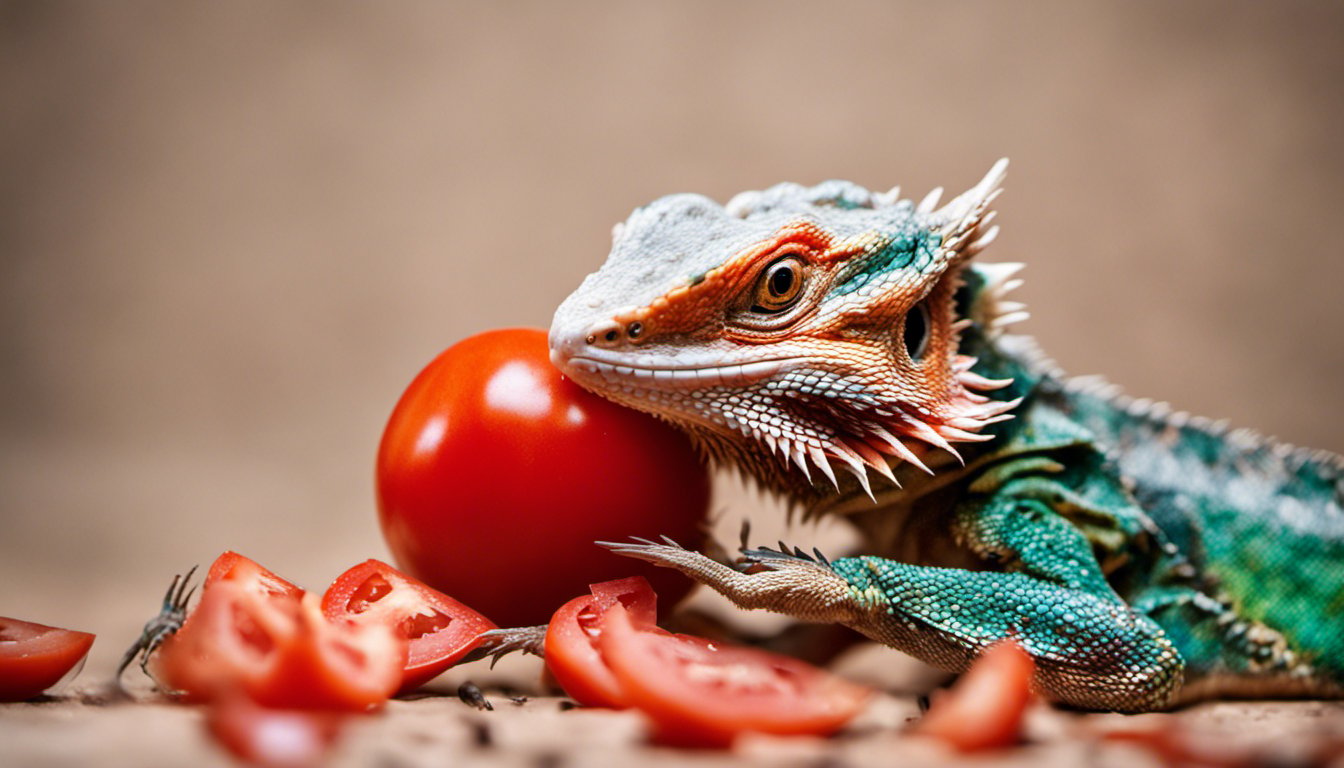
Imagine you’re a new bearded dragon owner wanting to provide the best diet for your scaly friend. You’ve read about their dietary requirements but are still unsure about certain foods like tomatoes. Can bearded dragons eat tomatoes? Are there any risks involved?
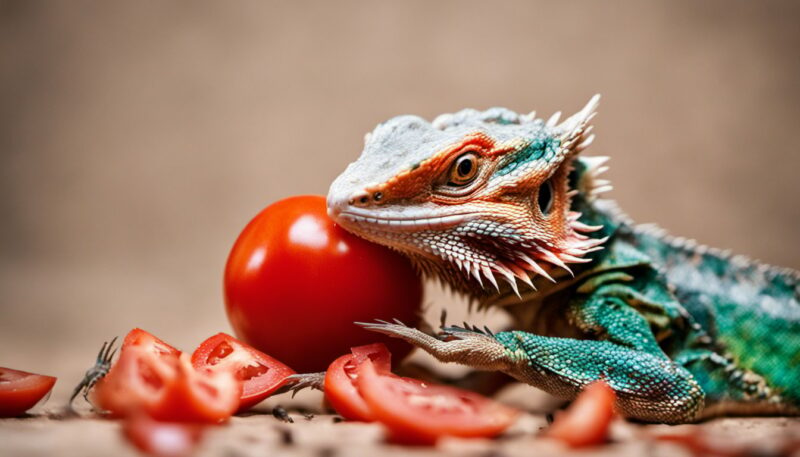
In this blog post, we’ll delve into the world of bearded dragon nutrition, answer these questions, and provide valuable tips on feeding your pet a balanced and safe diet.
Understanding the dietary needs of your bearded dragon is crucial for their overall health and well-being. You can help your pet thrive and live a long, happy life with the right balance of plant matter, insects, and supplements. Let’s explore the ins and outs of bearded dragon diets and ensure your scaly friend gets all the necessary nutrients.
Contents
Table of Contents
Short Summary
Bearded dragons can eat tomatoes in moderation as part of a balanced diet; potential risks such as high levels of oxalates and acidity should be considered.
Insects, vegetables, and supplements are necessary for creating a healthy bearded dragon diet. Regular monitoring is essential to ensure their well-being.
Veterinary care is an important factor in providing optimal health for bearded dragons.
Can Bearded Dragons Eat Tomatoes?
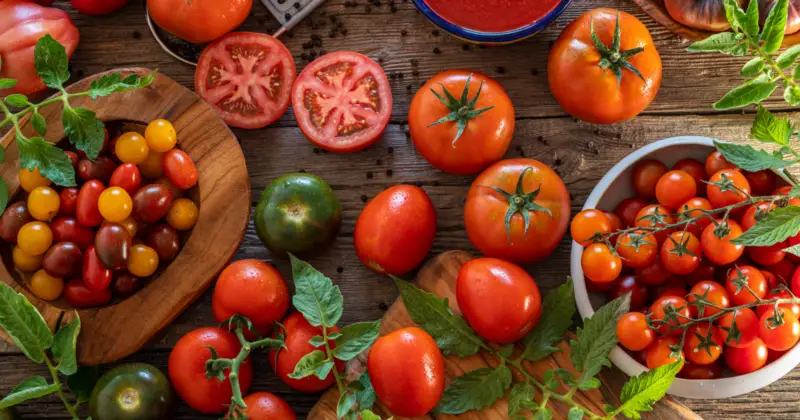
Do bearded dragons eat tomatoes? It’s a question worth asking. The answer is yes but with a few caveats. Tomatoes can be a part of your bearded dragon’s diet, but they should only be offered in moderation due to potential risks. It’s essential to understand the nutritional benefits and potential risks associated with feeding tomatoes to your pet before making them a regular part of their diet.
In the following subsections, we’ll dive deeper into the nutritional benefits of tomatoes for bearded dragons, potential risks, and guidelines on how often to offer tomatoes to your scaly companion. This way, you’ll be well-equipped to make informed decisions about your bearded dragon’s diet.
Nutritional Benefits of Tomatoes for Bearded Dragons
Tomatoes offer some nutritional benefits for bearded dragons. They are a source of vitamins A, C, and K, which are essential in maintaining your pet’s overall health. However, it’s important to note that tomatoes should only be provided once or twice per week, as there are other fruits and vegetables that can offer additional nutrients. For instance, bearded dragons can eat broccoli for more vitamins and minerals.
Besides tomatoes, bearded dragons eat bananas and apples, and occasionally, bearded dragons eat blueberries. These fruits provide a variety of vitamins and minerals, contributing to a balanced and varied diet for your pet. Remember that moderation is key when offering fruits to your bearded dragon, as too much can lead to health issues.
Potential Risks of Feeding Tomatoes to Bearded Dragons
Feeding tomatoes to your bearded dragon comes with certain risks. One concern is the high levels of oxalates found in tomatoes, which can interfere with calcium absorption and lead to metabolic bone disease if consumed daily. In addition, tomatoes can be acidic, which may cause digestive problems if ingested excessively.
To mitigate these risks, offering tomatoes as an occasional treat rather than a staple in your bearded dragon’s diet is important. Maintaining a varied diet that includes other fruits and vegetables with lower oxalate and acidity levels can help ensure your bearded dragon receives all the necessary nutrients without risking its health.
How Often to Offer Tomatoes to Your Bearded Dragon
When it comes to offering tomatoes to your bearded dragon, moderation is essential. Tomatoes should only be provided occasionally, as part of the 10% infrequent greens, vegetables, and fruits in the plant matter segment of their diet. Feeding tomatoes too frequently can lead to vitamin A toxicity, harming your pet’s health.
A balanced feeding schedule for adult bearded dragons includes offering chopped vegetables and fruit in the morning and a portion of plant matter accompanied by a few insects in the evening. By sticking to this schedule and limiting the intake of tomatoes, you can provide a healthy and varied diet for your bearded dragon.
Other Fruits and Vegetables for Bearded Dragons
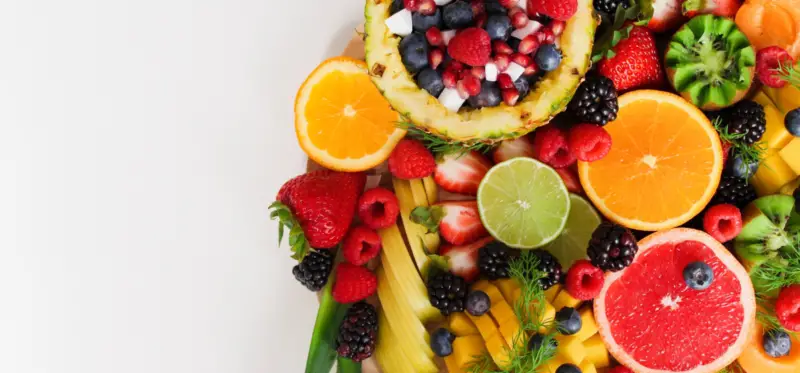
Apart from tomatoes, there are numerous other fruits and vegetables that are safe and nutritious for many bearded dragons. Providing a diverse diet is essential to ensure your pet receives all the necessary vitamins and minerals for optimal health.
In the following subsections, we’ll explore safe fruits, safe vegetables, and foods to avoid for bearded dragons. Understanding which fruits and vegetables suit your bearded dragon can create a balanced diet that contributes to their overall well-being. Always monitor your pet’s health and consult a veterinarian if you notice any signs of illness.
Safe Fruits
Safe fruits for bearded dragons include apples, bananas, and berries like blueberries, strawberries, and blackberries. In fact, bearded dragons eat apples as part of their balanced diet. These fruits provide various health benefits, including stimulation of the immune system, eye health, bone growth, and density, due to the presence of vitamins A, C, and K.
It’s important to remember that fruits should only be offered as an occasional treat, as excessive fruit consumption can lead to health issues. By incorporating a variety of safe fruits into your bearded dragon’s diet, you can ensure they receive the essential nutrients they need to thrive.
Safe Vegetables
Bearded dragons require a variety of vegetables in their diet, and bearded dragons eat carrots as well. Examples of suitable veggies include cabbage, collard greens, kale, pumpkin, and sweet potatoes. These vegetables provide essential vitamins, minerals, and fiber that contribute to a healthy dragon diet. Additionally, they offer a range of antioxidants and phytonutrients that can help bolster a robust immune system.
It’s crucial to regularly offer your bearded dragon a mixture of safe vegetables to ensure they receive all the necessary nutrients. Combining different types of vegetables and rotating them can help promote a diverse and balanced diet for your healthy friend.
Foods to Avoid
While many fruits and vegetables are safe for bearded dragons, some should be avoided due to potential health risks or toxicity. Some examples include avocados, citrus fruits, tomatoes, nuts, oats, processed meat, and wild-caught insects.
Additionally, certain vegetables, such as spinach, romaine, iceberg lettuce, celery, Swiss chard, beet greens, and rhubarb, should be avoided. It’s a common misconception that bearded dragons eat broccoli, but it’s best to steer clear of this potentially harmful food. By avoiding these foods, you can help ensure your bearded dragon maintains a healthy diet that supports its overall well-being.
Always consult with a veterinarian or an experienced reptile caregiver if you’re unsure about the safety of a particular food item.
Feeding Tips for a Balanced Bearded Dragon Diet
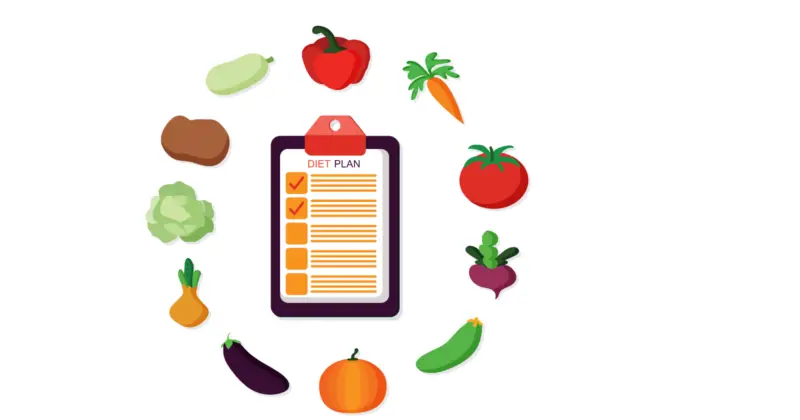
Providing a balanced diet for your bearded dragon is essential for their overall health and well-being. This includes offering the proper ratio of insects to plant matter, appropriate portion sizes, and sticking to a consistent feeding schedule. It’s important to know that bearded dragons eat spiders, among other insects, as part of their diet.
In the following subsections, we’ll discuss insects for bearded dragons, plant matter for bearded dragons, and feeding schedules and portion sizes.
By incorporating these feeding tips into your bearded dragon’s care routine, you can help ensure they receive all the nutrients they need to live a long and healthy life. Remember that a well-rounded diet is the foundation for your pet’s overall health.
Insects for Bearded Dragons
Insects are crucial to a bearded dragon’s diet, providing essential protein and nutrients. Bearded dragons can feed on various insects, including crickets, dubia roaches, mealworms, phoenix worms, and hornworms. These types of insects are suitable for bearded dragons.
It’s important to feed insects of an appropriate size, especially for baby and juvenile bearded dragons, to prevent choking or impaction. A good rule of thumb is to ensure the feeder insect does not exceed the space between the bearded dragon’s eyes.
In addition to providing a variety of insects, it’s important to gut-load insects before feeding them to your bearded dragon. Gut-loading refers to feeding insects a nutrient-rich diet before offering them to your pet, ensuring your bearded dragon receives maximum nutritional benefits from its insect meals.
Plant Matter for Bearded Dragons
Plant matter is an essential component of a bearded dragon’s diet, providing vital vitamins and minerals that may not be available from insects alone. Leafy greens and other vegetables should make up 20-30% of your bearded dragon’s diet, with the remaining 70-80% consisting of insects.
To ensure a proper balance of plant matter in your bearded dragon’s diet, offer a variety of leafy greens and vegetables, such as collard greens, mustard greens, and green beans. Finely chop and mix these items to create a diverse and nutrient-rich salad for your bearded dragon.
Feeding Schedule and Portion Sizes
Establishing a consistent feeding schedule and offering appropriate portion sizes is crucial for maintaining your bearded dragon’s overall health. Young bearded dragons should be fed 2-3 times daily, while adults can be fed once or twice daily. Baby and juvenile bearded dragons should be offered all the insects they can consume in 5-10 minutes during each feeding session.
A baby bearded dragon needs at least a half-cup of chopped veggie mix daily for their diet. For juveniles, it should be 3/4 cup, and adults require a cup to a half cup per day. Adhering to these guidelines can help your bearded dragon maintain a healthy weight and avoid potential health issues related to improper diet.
Supplements for Bearded Dragons

Supplements play a crucial role in a bearded dragon’s diet by providing essential vitamins and minerals that may be lacking in their food. This section discusses the importance of calcium, vitamin D3, and multivitamin supplements for your bearded dragon’s overall health and well-being.
By understanding the role of supplements in your bearded dragon’s diet, you can ensure they receive all the necessary nutrients to thrive. Remember that a balanced diet and appropriate supplementation are key to maintaining your pet’s health.
Calcium Supplements
Calcium is vital for bearded dragons, as it is necessary for proper bone growth and development. Many commercially raised feeder insects are deficient in calcium, and your bearded dragon may require additional calcium supplementation to maintain their health. One way to supplement calcium is by dusting salads and insects with a calcium powder, such as Repashy Calcium Plus.
When supplementing your bearded dragon’s diet with calcium, it’s important to balance calcium and phosphorus intake. A balanced calcium-to-phosphorus ratio is essential for preventing metabolic bone disease, a common health issue in bearded dragons.
Vitamin D3 Supplements
Vitamin D3 is essential for bearded dragons, as it helps them effectively absorb calcium from their diet. Two primary ways to provide vitamin D3 to your bearded dragon are through supplementation or UVB lighting. Bearded dragons can synthesize vitamin D3 when exposed to UVB light, which can be provided through a specialized reptile UVB lamp in their enclosure.
If you choose to supplement your bearded dragon’s diet with vitamin D3, it’s important to use a reptile multivitamin that contains appropriate levels of vitamin D3. Consult with your veterinarian or an experienced reptile caregiver to ensure you’re providing the correct dosage of vitamin D3 for your bearded dragon’s specific needs.
Multivitamin Supplements
Multivitamins can help ensure your bearded dragon receives all the essential vitamins and minerals it needs to maintain its overall health. A well-rounded diet should minimize the need for supplementation, but multivitamins can be beneficial for filling in any nutritional gaps.
When choosing a multivitamin supplement for your bearded dragon, opt for a product designed specifically for reptiles, such as Herptivite Multivitamin for Reptiles. It’s important to consult with your veterinarian or an experienced reptile caregiver to determine the appropriate dosage and frequency of multivitamin supplementation for your bearded dragon’s specific needs.
Can Bearded Dragons Eat Tomatoes?
Monitoring Your Bearded Dragon’s Health
Keeping a close eye on your bearded dragon’s health is crucial for maintaining its well-being. This section will provide tips on monitoring your bearded dragon’s health, including signs of illness, weight management, and when to consult a veterinarian.
Regularly monitoring your baby bearded dragons’ health and adjusting their diet as needed can help prevent potential health issues and ensure your bearded dragon pet lives a long and healthy life.
Signs of Illness
Awareness of the common signs of illness in bearded dragons is important, as early detection can help prevent more severe health issues. Some signs to watch include lethargy, appetite loss, respiratory difficulties, eye and nasal discharge, irregular stool, aggression, and skin issues.
If you notice any of these symptoms in your bearded dragon, it’s important to seek veterinary care promptly. Regular check-ups and maintaining a clean enclosure can also help prevent illness and ensure your bearded dragon stays healthy.
Weight Management
Maintaining a healthy weight is crucial for your bearded dragon’s overall health. To monitor your pet’s weight, use a kitchen scale and a bowl or larger container, and track their weight regularly. The average weight for an adult bearded dragon is approximately 400 to 550 grams.
Providing an appropriate diet and ensuring your bearded dragon gets enough exercise are essential for maintaining a healthy weight. If you notice any sudden weight changes, consult your veterinarian to address any potential health issues.
Veterinary Care
Regular veterinary check-ups are essential for maintaining your bearded dragon’s health. It’s recommended to bring your pet in for an initial exam and then annually. If your bearded dragon exhibits signs of illness or has a sudden change in appetite or thirst, it’s imperative to seek veterinary care promptly.
Finding a reputable reptile veterinarian and preparing for visits is crucial for ensuring your bearded dragon receives the best care possible. With regular veterinary care and a balanced diet, you can help your bearded dragon live a long and healthy life.
Summary
In conclusion, providing a balanced and varied diet is crucial for your bearded dragon’s health and well-being. While tomatoes can be a part of their diet, they should be offered in moderation due to potential risks. By incorporating a diverse range of safe fruits, vegetables, insects, and supplements, you can ensure your bearded dragon receives all the essential nutrients it needs to thrive.
Remember that regularly monitoring your bearded dragon’s health, weight management, and veterinary care are all essential to maintaining their overall well-being. You can help your bearded dragon live a long and healthy life with the proper care and attention.
Frequently Asked Questions
What veggies can Beardies not eat?
Bears should not eat spinach, broccoli, and romaine as they may be harmful or nutritionally unbeneficial.
How often can bearded dragons eat tomatoes?
Bearded dragons can eat tomatoes in small amounts once a month. It should be served as an occasional treat, not part of the regular diet.
Can bearded dragons eat cucumber or tomato?
Yes, bearded dragons can eat tomatoes, but they should only have them in very small amounts and not more than once a month.
What fruits are toxic to bearded dragons?
It is best to avoid oranges, lemons, and limes as they are too acidic for bearded dragons, potentially causing gastrointestinal irritation. Raspberries can be consumed occasionally.
What does a bearded dragon need to eat daily?
Bearded dragons require a diet of leafy greens and fresh vegetables each day, supplemented with insects for juveniles. Adults require mostly plants with some insects, while juveniles should have a more insect-heavy meal plan with 3-4 weekly feedings. Vegetables, fruits, and live worms can also be offered to vary their diet.

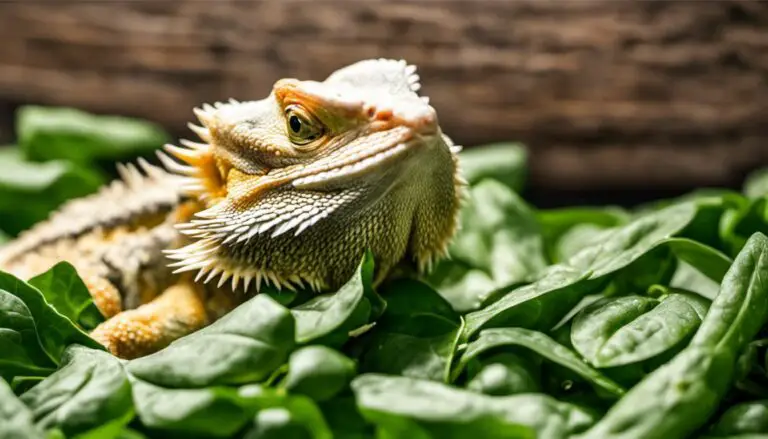
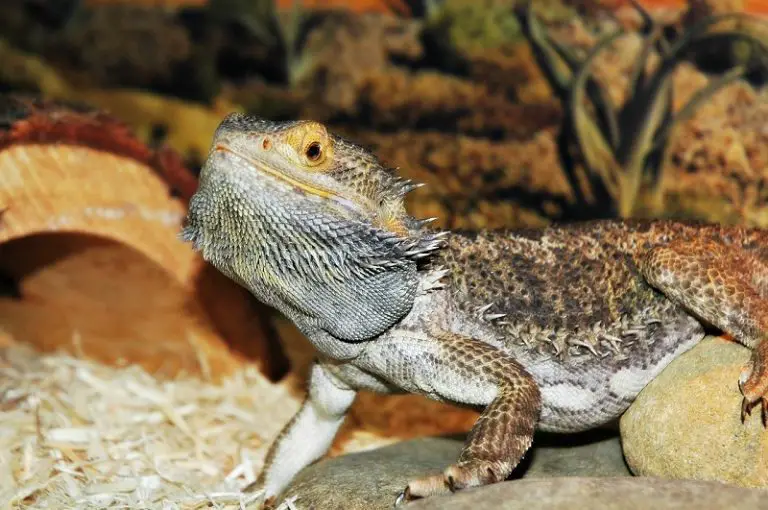
![Best Insects For Bearded Dragons [Must Read]](https://allourcreatures.com/wp-content/uploads/2021/10/bigstock-A-Bearded-Dragon-pogona-Sp-E-412949071-768x512.jpg)
